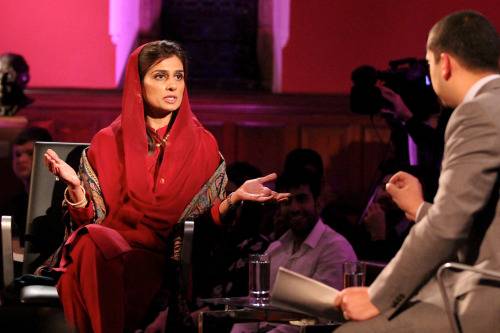Several years ago, the best-selling British writer and religious scholar, Karen Armstrong, toured Pakistan in part to promote the Charter of Compassion movement whose stated mission is to encourage the world’s religions to embrace the core values of empathy and togetherness. Armstrong is the author of the charter and one of the movement’s founding members.
One of the talks she gave was held in the lawns of the Rafi Peer Theatre Workshop in Lahore. “We need to stop projecting ‘certainties’ because there are none and this is the only way we will be compassionate towards the views and will of others,” she told a rapt audience.
When the discussion was opened to the floor, a middle-aged gentleman commented that not only did he agree with the salient features of Miss Armstrong’s exhortations, but that compassion was a quality that came easy to Muslims because of the universal underpinnings of their faith. A Muslim, he explained, would have no difficulty showing compassion towards a Christian or a Jew because Islam embraces the inherent truth of all world religions.
For anyone with even a cursory knowledge of the status of minorities in Pakistan it came across as an extraordinary statement. While Islam may promote principles of tolerance and compassion towards all peoples, these seem to have been overlooked by many in this country which according to a Pew Research Center report from 2014 has become one of the most hostile nations in the world for religious minorities.
At the end of the session I had the chance to speak and chose to refer back to the point the aforementioned gentleman had made. I made the argument that whereas in principle Muslims are obliged to respect people of other faiths, this courtesy, on the rare occasions it is extended in Pakistan, seems to be applicable only to members of those faiths or religious movements that preceded Islam. Later religious traditions appear unworthy of any such considerations.
My remarks were spurred by thoughts of the plight of Pakistan’s Ahmadis.
The situation of Ahmadis in Pakistan embodies the very worst of the deeply ingrained religious intolerances that have for decades ripped away at the fabric of our national unity. Not only are large swathes of the population openly hostile to the community, their persecution is part of state policy. They have been declared non-Muslim through the second constitutional amendment and Ahmadi-specific laws formally criminalize every aspect of their civic and civil lives. Moreover, to receive a passport as a Muslim in Pakistan one has to first denounce the founder of the Ahmadiyya movement.
The state-sponsored aspect of Ahmadi persecution has recently returned to the fore of public discussion, after former foreign minister of Pakistan, Hina Rabbani Khar, answered a question about the anti-Ahmadi laws on an al-Jazeera talk show by saying that she was ‘embarrassed’ as a Pakistani by the discrimination the community faces.
The reaction to Khar’s comments was swift and brutal, particularly on social media where she was targeted with hateful messages and called among other things a disgrace and a traitor to her country.
Among all else, the controversy exposes the vicious double-standard that has become current amongst large swathes of Muslims in Pakistan in all matters pertaining to religion. Nowhere is this better highlighted than in the treatment of Ahmadis.
Imagine if you will the furor that would erupt if a predominantly Christian country like the United States of America or the United Kingdom asked their citizens to sign a similar declaration targeting Islam, in order to get a passport. Or if these countries prohibited Muslims from publicly talking about their faith or making the call to prayer. One need not think too hard about what uproar might ensue, as the likely scenes – flag burning, looting and arson – have already been rehearsed many times over.
Let us take recent events in Hafeez Center as another example. Last week protests were held outside of Lahore’s largest electronics market, after one of the shopkeepers there was arrested for displaying a sign which not only forbid entrance to Ahmadis, but referred to them as ‘dogs’. A speaker at the demonstration called for his release and said that his only crime was to express his religious zeal.
And yet it is easy to think of the fury that would greet the news of an Indian shopkeeper banning Muslims from entering his store and using similar derogatory language against them. Just look at the feverish condemnations made by Pakistanis against the Indian government’s decision to enforce a ban on the slaughter of cows to get an idea of the kind of repercussions that would follow.
Again in January of this year, tens of thousands of people took to the streets in anger at the cartoons published by the French satirical magazine Charlie Hebdo. The largest of the rallies was in Karachi which drew as many as 25,000 thousand protestors who raised slogans like ‘death to France’ and ‘death to blasphemers’. In Peshawar tributes were paid to the two brothers who carried out a retaliatory terror attack against the publication. Though ever ready to rally in defense of Islam, few voices if any are raised at routine provocations against Ahmadis, their founder and respected figures within the community.
Just because many may consider Ahmadis to be non-Muslims it doesn’t mean that they have the right to impose that identity on them or prohibit them from practicing their beliefs. Similarly, Christian or Hindu majority populated countries have no right to discriminate or negatively profile the Muslims in their midst. If Pakistanis want equality and justice for their co-religionists abroad then they need to develop ideals of religious tolerance back at home first. Or else the contrasting principles they adhere to will continue to ignite hatred against others.






